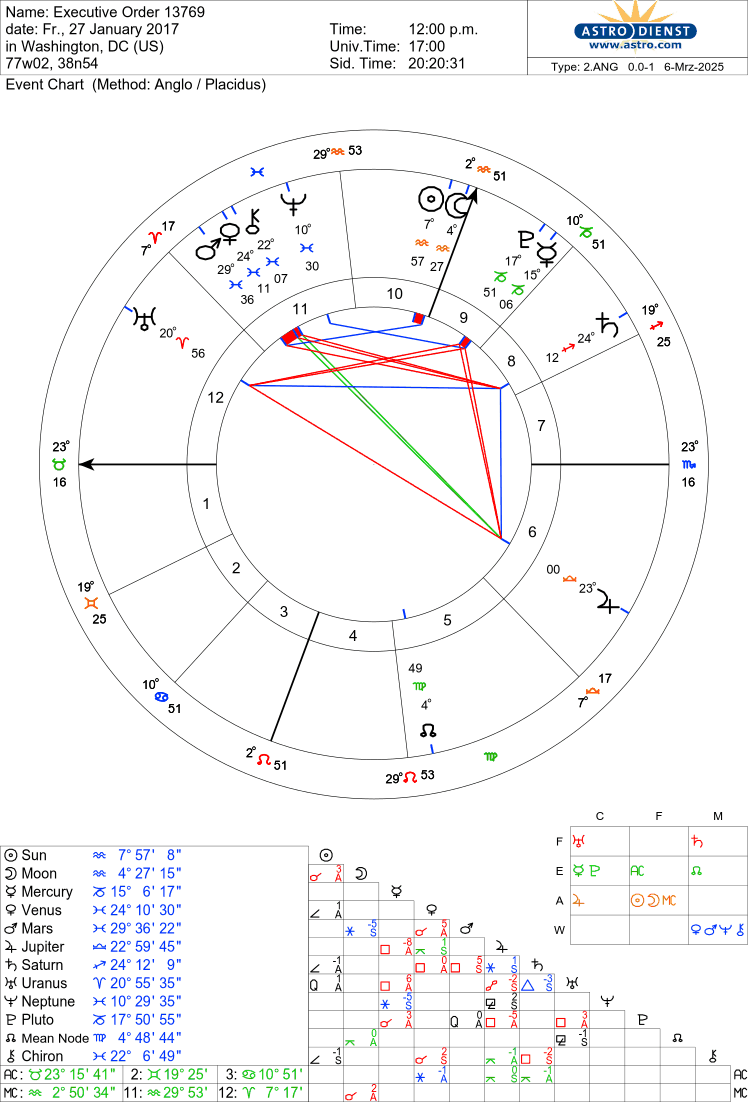The Jupiter-Saturn Square: a Moment of International Crisis
On Trump, Europe and the new world order
What do the assassination of a health insurance CEO in America, anti-immigration riots in the UK, and an unexpected AI breakthrough in China have in common?
On the face of it, absolutely nothing. These events appear to be disjointed episodes from the tumultuous news cycle of the past several months. Only a demented conspiracy theorist—or an astrologer—would attempt to connect them in any meaningful way.
Well, as someone in the latter category: hold my beer…
**This post marks the first entry in a series that will, hopefully, reveal the archetypal context that unites these seemingly disconnected events, so make sure to subscribe if you’d like to follow along**
Among all the astrological aspects that have captured people's attention in recent months, the opening square of the Jupiter-Saturn cycle ranks fairly low on the agenda. It simply can't compete with the epoch-making drama of Pluto's ingress into Aquarius or the disturbing spectacle of America’s Pluto return. However, this aspect is—in my opinion—key to understanding the events of the past several months, as I will attempt to demonstrate in what follows.
The Jupiter-Saturn Square
This transit began in the summer of last year when Jupiter moved into the middle degrees of Gemini, forming a square with the slower-moving Saturn—currently traversing the sign of Pisces. I won’t dwell on the meaning of the signs here, my focus will instead be on the broader through line of the Jupiter-Saturn cycle.
The last dynamic aspect of these planets—the conjunction—occurred during the COVID pandemic of 2020, which offers a clue as to what we might expect when Jupiter—the planet of growth, expansion and leadership—squares off with Saturn—the planet of contraction, limitation and crisis.
If you're new to astrology and unclear about the meaning of these planets, bear with me—their significance will, hopefully, become apparent over the course of this exploration.
The Return of Trump
Trump is back in the White House, and it would be remiss not to mention this upfront as his policy agenda is shaping the Jupiter-Saturn zeitgeist in significant ways.
What unites Trump’s major policy initiatives—mass deportations, the rolling back of Diversity, Equity and Inclusion (DEI) measures, and the imposition of tariffs on foreign goods—is that they are decisive moves against many of the things that Jupiter archetypically represents.
We can think of Jupiter as representing matters that are international in scope; international relations, tourism and immigration, imports and exports, etc. It also signifies economic matters more generally. The Jupiterian impulse is typically geared towards growth, commercialization, expansion and diversification. Its liberal and magnanimous in nature, but also prone to inflation, hubris and elitism.
When Saturn forms an aspect with Jupiter it tends to inhibit or negate the Jupiterian impulse in one way or another. The nature of Saturn is to impose limits on the other planetary archetypes, to curb their excesses and stifle their full expression. At its best, Saturn forces the other planetary archetypes to undergo a crisis or maturation so that they might emerge from the process with greater fortitude and resilience.
During the previous conjunction of these planets in 2020—which was intensified by the involvement of Pluto—a global pandemic brought the world economy to a near standstill and led to a total collapse of the travel and tourism industries. This period was also characterized by rampant Sinophobia—inflamed by Trump’s use of the term “China virus”—and a hardening of relations between many countries.
What we are seeing now is a resumption of this more frigid mood on the international scene. Trump is, of course, setting the tone for this with his bellicose statements about annexing Greenland and Canada, in addition to his ramping up of economic hostilities with US trading partners; but other countries are following suit, as nationalist parties continue to gain a foothold throughout Europe via populist platforms that are strongly opposed to immigration and globalization.
In the UK, for instance, the Nigel Farage led Reform party is now leading with voters, having overtaken both Labour and the Conservatives, according to some polls. While in Germany, the far-right Alternative für Deutschland became the second largest party after the recent election.
It’s worth noting that many of the leaders of this growing populist-nationalist movement have significant Jupiter-Saturn aspects in their natal charts. This list includes:
Trump (square)
Farage (sextile)
JD Vance (sextile)
Elon Musk (opposition)
Giorgia Meloni of Italy (square)
Marine Le Pen of France (sesqui-quadrate)
Geert Wilders of the Netherlands (sextile)
and Javier Milei of Argentina (opposition)
A key feature of this movement is the scapegoating of immigrants for a wide range of social and economic ills. It seems to be very easy to channel popular discontent in the direction of foreigners—whether immigrants who are seeking a better life, or refugees displaced by war—who often originate from cultures that can seem strange or threatening to the native populace.
These foreign nationals are often cast as subversive influences, who are seeking to undermine the host nation’s integrity by the importation of values and behaviors that are fundamentally at odds with those of the host nation.
"In Springfield, they are eating the dogs. The people that came in, they are eating the cats. They’re eating – they are eating the pets of the people that live there."
- Donald Trump
We saw this scapegoating in action during the initial months of the Jupiter-Saturn square—just as Mars activated the transit via hard aspect—when far right, anti-immigration riots erupted in cities throughout the UK,1 stoked by online agitators.
This phenomenon of othering foreigners, and seeking to ban, deport or otherwise exile them from society, is a phenomenon of the Jupiter-Saturn cycle. As a collective, we are unconsciously acting out the drama of Jupiter-in-exile. We are estranged from, and wary of, that universal principle that seeks to expand our horizons, and which is easily personified in the form of the Traveler or the Migrant.
Recall, Saturn is the very principle of distance and alienation, its tendency is to isolate and harden, to create solid boundaries between things, to “build walls.” At least this is what it tends to do when it’s not channeled into more conscious and constructive directions.
We saw similar outpourings of xenophobia and anti-immigration sentiment during previous alignments of the Jupiter-Saturn cycle: the previous square aspect of these planets coincided with the European migrant crisis, as well as “Brexit”—the decision of UK voters to leave the European Union, following a referendum in June 2016.2
The sextile that followed that alignment coincided with Trump’s move to restrict the travel of certain groups into the US—otherwise known as the “Muslim ban”—during his first presidency.3
There is nothing new here, although we do seem to have reached a distinct inflection point with regards to the consolidation of these forces as an international movement.
At its best, the Jupiter-Saturn combination represents a healthy conservative impulse—an affirmation (Jupiter) of history, hierarchy and tradition (Saturn) that can play a stabilizing role in society through the cultivation of bonds of loyalty and respect between a nation’s people.
In ideal circumstances, this impulse can act as a bulwark against some of the more fickle and ill-conceived notions that spring forth in the name of openness or pluralism, for instance, while not dogmatically closing a society off to the potentials of progressive change.
Returning now to Trump’s domestic agenda, the rolling back of DEI measures similarly reflects the curtailment of the Jupiter archetype; if we understand Jupiter as the very principle of broadness and diversity—for example, the broadness of mind that can arise from being exposed to diverse cultures and perspectives, as a result of long distance travel or educational attainment—then Jupiter-Saturn transits suggest efforts to hamper this diversity in favor of a more narrow, exclusive and homogenized type of experience.
A parallel expression of this theme is playing out in the UK, where the higher education sector is facing a severe financial crisis, driven in part by a decline in international student enrollment.
In the time since I began writing this article, international tensions have escalated even further, with the breakdown of relations between the US and Ukraine. This is sending shock waves throughout Europe, where nations are bracing themselves for a new world order in which the US can no longer be regarded as an ally. This fracturing of the international order reflects a Saturnian contraction of the Jupiterian sphere.
In response to these developments, the UK Prime Minister Keir Starmer has announced a massive increase to the UK’s defense budget, in a move that reveals another facet of the Jupiter-Saturn dynamic: the amplification and expansion of the Saturnian impulse.
Remember, Saturn is the principle of defense and fortification. So when Jupiter forms an aspect with Saturn, we should expect this principle to be affirmed and enriched in a way that reflects the amplifying influence of the Jupiter archetype upon it (Jupiter→Saturn).
We saw this impulse at work during the pandemic, when social distancing and lockdown restrictions were implemented across the world in an attempt to curtail the spread of the virus. Those measures were Saturnian in nature, in that they entailed efforts to fortify and defend ourselves against a significant threat. Whether it is prudent to do so or not, the ramping up of defense spending (at the expense of foreign aid) is likewise Saturnian in nature.
As I mentioned up top, I will have more to say about the Jupiter-Saturn square in the weeks to come, so please subscribe if you’d like to see how this aspect has played out in many other realms of experience.
Thanks for reading.









